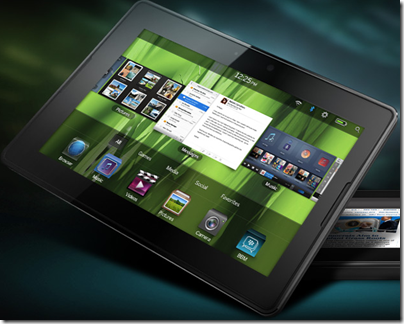Blackberry has announced its pitch for the emerging tablet market, the 7” screen PlayBook. It has a new OS base on QNX Neutrino, a webkit-based web browser, Adobe Flash and AIR – offline Flash applications – front and rear cameras for video conferencing as well as taking snaps, and includes a USB port and HDMI out. There is wi-fi and Bluetooth but no 3G in the first release; you can connect to the Internet via your Blackberry. Storage is not yet specified as far as I can tell. There is no physical keyboard, which is surprising in some ways as the keyboard is the reason I hear most often for users choosing a BlackBerry smartphone over Apple’s iPhone.
Alongside the PlayBook RIM has announced a new developer platform. WebWorks is an HTML5 platform extended with access to local APIs, and targets both the Tablet OS and BlackBerry smartphones:
BlackBerry WebWorks applications can tap into the always-on, notification-based, push-enabled, contextual and social attributes of the BlackBerry smartphone. These applications can also access hardware features and integrate with other apps, and are powerful Super Apps that are fully integrated into the BlackBerry Application Platform.
In order to access local resources you need to package your app as a Blackberry application. Java and native C applications are also supported.
A winner? Well, there is a widespread industry presumption that we all want tablets; for example NVIDIA CEO Jen-Hsun Huang is planning on this basis, judging by what he said to the press last week. It is certainly a market in which every vendor wants a presence. There are a number of open questions though. The new tablet market is really defined by Apple’s iPad, and success for other operating systems and form factors is yet to be demonstrated. Personally I am not sure about the 7-inch screen, which is perhaps too large for a pocket and too small for the desktop-like web browsing you can do on an iPad. Here are the dimensions:
- BlackBerry PlayBook: 7-inch 1024×600 screen,130mm x 193mm x 10mm
- Apple iPad: 9.7-inch 1024×768 screen, 189.7mm x 242.8mm x 13.4mm
I doubt there will be much enthusiasm for carting around a phone, a small tablet, and a laptop, so in order to be viable as a portable device for work it has to be a laptop replacement. I do see this happening already with the iPad, though for me personally a netbook is both cheaper and more practical.
Apps are another key factor. It is smart of RIM to support Flash and AIR, which along with HTML 5 web applications are likely the best bet for supporting something like the PlayBook without a lot of device-specific work.
